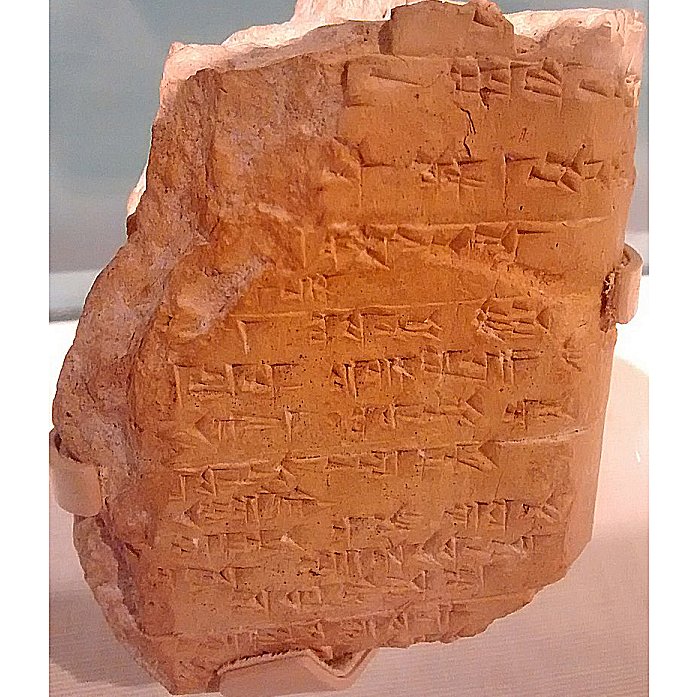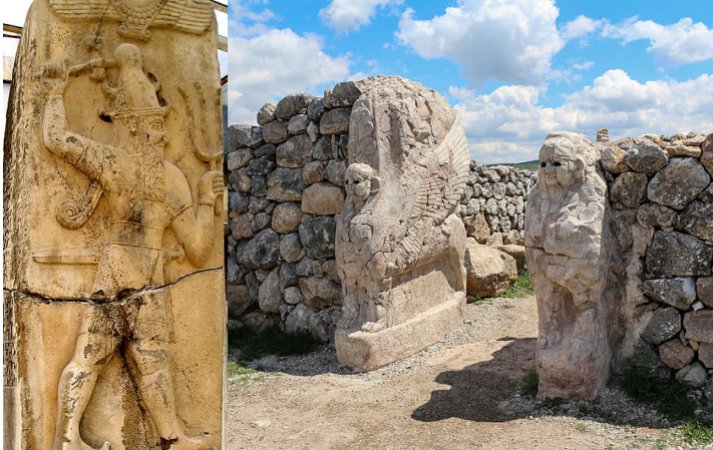Code Of Nesilim: Ancient Laws Of The Hittites
Ellen Lloyd - AncientPages.com - Like many other great ancient civilizations, the Hittites had laws that regulated various aspects of their vast empire. Written somewhere from 1650-1500 BC, the Code of Nesilim was a document that stated ancient laws of the Hittites.
One of its most significant topics concerned the treatment of slaves.
A Hittite tablet found at Hattusa believed to be a legal deposition. Image credit: Mx. Granger - CC0
The Hittites ruled the central Anatolian kingdom of Hatti from c. 1900 – 800 BCE. They formed the earliest known Anatolian civilization and employed an advanced system of government based on an established legal system. Their military was well trained, well equipped, and employed chariots that were the lightest and fastest of their time.
The Hittites created Hattusha, the capital of the kingdom, located in Turkey. The Hittite empire reached its height during the mid-14th century BC when it encompassed an area that included most of Asia Minor.
After 1180 B.C. the empire came to an end during the Bronze Age collapse. Several independent Neo-Hittite city-states were established and some of them survived until the 8th century BC. The Hittite laws have been preserved on a number of Hittite cuneiform tablets found at Hattusa (CTH 291-292, listing 200 laws). Copies have been found written in Old Hittite as well as in Middle and Late Hittite, indicating that they had validity throughout the duration of the Hittite Empire (ca. 1650–1100 BCE).
The Code of Nesilim reveals much about the social structure of the society. Compared to the Code of Hammurabi, where death was the punishment for the majority of the offenses described the punishments stated in the Code of Nesilim were not very severe.
Some laws in the Code of Nesilim were rather unusual according to modern standards. For example, if a man raped a woman outdoors, he was sentenced to death. However, if the rape happened at home, it was deemed to be the fault of the woman and she was sentenced to die.
1. If anyone slay a man or woman in a quarrel, he shall bring this one. He shall also give four persons, either men or women, he shall let them go to his home.
2. If anyone slay a male or female slave in a quarrel, he shall bring this one and give two persons,either men or women, he shall let them go to his home.
3. If anyone smite a free man or woman and this one die, he shall bring this one and give two persons, he shall let them go to his home.
4. If anyone smite a male or female slave, he shall bring this one also and give one person, he shall let him or her go to his home.
5. If anyone slay a merchant of Hatti, he shall give one and a half pounds of silver, he shall let it goto his home.
Left: Neo-Hittite storm god "Tarhunzas" in the Aleppo museum. Credit: Verity Cridland, Wikipedia, CC BY 2.0 - Right: Sphinx Gate, Hattusa, Turkey. Credit: Bernard Gagnon, Wikipedia, CC BY-SA 3.0
6. If anyone blind a free man or knock out his teeth, formerly they would give one pound of silver,now he shall give twenty half-shekels of silver.
8. If anyone blind a male or female slave or knock out their teeth, he shall give ten half-shekels of silver, he shall let it go to his home.
10. If anyone injure a man so that he cause him suffering, he shall take care of him. Yet he shall give him a man in his place, who shall work for him in his house until he recovers. But if he recover, hes hall give him six half-shekels of silver. And to the physician this one shall also give the fee.
17. If anyone cause a free woman to miscarry, if it be the tenth month, he shall give ten half-shekelsof silver, if it be the fifth month, he shall give five half-shekels of silver.
18. If anyone cause a female slave to miscarry, if it be the tenth month, he shall give five half-shekels of silver.
20. If any man of Hatti steal a Nesian slave and lead him here to the land of Hatti, and his master discover him, he shall give him twelve half-shekels of silver, he shall let it go to his home.
21. If anyone steal a slave of a Luwian from the land of Luwia, and lead him here to the land of Hatti, and his master discover him, he shall take his slave only.
24. If a male or female slave run away, he at whose hearth his master finds him or her, shall give fifty half-shekels of silver a year.
31. If a free man and a female slave be fond of each other and come together and he take her for his wife and they set up house and get children, and afterward they either become hostile or come to close quarters, and they divide the house between them, the man shall take the children, only one child shall the woman take.
32. If a slave take a woman as his wife, their case is the same. The majority of the children to the wife and one child to the slave.
33. If a slave take a female slave their case is the same. The majority of children to the female slave and one child to the slave.
34. If a slave convey the bride price to a free son and take him as husband for his daughter, nobody dare surrender him to slavery.
36. If a slave convey the bride price to a free son and take him as husband for his daughter, nobody dare surrender him to slavery.
40. If a soldier disappear, and a vassal arise and the vassal say, AThis is my military holding, but this other one is my tenancy, @ and lay hands upon the fields of the soldier, he may both hold the military holding and perform the tenancy duties. If he refuse the military service, then he forfeits the vacant fields of the soldier. The men of the village shall cultivate them. If the king give a captive, they shall give the fields to him, and he becomes a soldier.
98. If a free man set a house ablaze, he shall build the house, again. And whatever is inside the house, be it a man, an ox, or a sheep that perishes, nothing of these he need compensate.
99. If a slave set a house ablaze, his master shall compensate for him. The nose of the slave and his ears they shall cut off, and give him back to his master. But if he do not compensate, then he shall give up this one.
158. If a man go for wages, bind sheaves, load it into carts, spread it on the straw barn and so forth "till they clear the threshing floor, for three months his wages are thirty pecks of barley. If a woman go for wages in the harvest, for two months he shall give twelve pecks of barley.
159. If anyone harness a yoke of oxen, his wages are one-half peck of barley.
160. If a smith make a copper box, his wages are one hundred pecks of barley. He who makes a copper dish of two-pound weight, his wages are one peck of emmer.
164. If anyone come for borrowing, then make a quarrel and throw down either bread or wine jug, then he shall give one sheep, ten loaves, and one jug of beer. Then he cleanses his house by the offering. Not until the year has elapsed may he salute again the other's house.
170. If a free man kill a serpent and speak the name of another, he shall give one pound of silver; if a slave, this one shall die.
173. If anyone oppose the judgment of the king, his house shall become a ruin. If anyone oppose the judgment of a lord, his head shall be cut off. If a slave rise against his master, he shall go into the pit.
176. If anyone buy an artisan's apprentice, buy either a potter, a smith, a carpenter, a leatherworker, a tailor, a weaver, or a lace-maker, he shall give ten half-shekels.
178. A plow-ox costs fifteen half-shekels of silver, a bull costs ten half-shekels of silver, a great cow costs seven half-shekels of silver, a sheep one half-shekel of silver, a draft horse twenty half-shekels of silver, a mule one pound of silver, a horse fourteen half-shekels of silver.
181-182. Four pounds of copper cost one half-shekel of silver; one tub of lard, one half-shekel of silver; two cheese one half-shekel of silver; a gown twelve half-shekels of silver; one blue woolen garment costs twenty half-shekels of silver; breeches cost ten half-shekels of silver...
187. If a man have intercourse with a cow, it is a capital crime, he shall die. They shall lead him to the king's hall. But the king may kill him, the king may grant him his life. But he shall not approach the king.
188. If a man have intercourse with his own mother, it is a capital crime, he shall die. If a man have intercourse with a daughter, it is a capital crime, he shall die. If a man have intercourse with a son, it is a capital crime, he shall die.
190. If a man and a woman come willingly, as men and women, and have intercourse, there shall be no punishment. And if a man have intercourse with his stepmother, there shall be no punishment; except if his father is living, it is a capital crime, the son shall die.
191. If a free man picks up now this woman, now that one, now in this country, then in that country, there shall be no punishment if they came together sexually willingly.
192. If the husband of a woman die, his wife may take her husband's patrimony.
194. If a free man pick up female slaves, now one, now another, there is no punishment for intercourse. If brothers sleep with a free woman, together, or one after the other, there is no punishment. If father and son sleep with a female slave or harlot, together, or one after the other, there is no punishment.
195. If a man sleep with the wife of his brother, while his brother is living, it is a capital crime, he shall die. If a man have taken a free woman, then have intercourse also with her daughter, it is a capital crime, he shall die. If he have taken her daughter, then have intercourse with her mother or her sister, it is a capital crime, he shall die.
197. If a man rape a woman in the mountain, it is the man's wrong, he shall die. But if he rape her in the house, it is the woman's fault, the woman shall die. If the husband find them and then kill them, there is no punishing the husband.
199. If anyone have intercourse with a pig or a dog, he shall die. If a man have intercourse with a horse or a mule, there is no punishment. But he shall not approach the king, and shall not become a priest. If an ox spring upon a man for intercourse, the ox shall die but the man shall not die. One sheep shall be fetched as a substitute for the man, and they shall kill it. If a pig spring upon a man for intercourse, there is no punishment. If any man have intercourse with a foreign woman and pick up this one, now that one, there is no punishment.
200. If anyone give a son for instruction, be it a carpenter, or a potter, or a weaver, or a tailor, or a smith, he shall give six half-shekels of silver for the instruction
As in all other ancient civilizations, slaves were not on the same level as free men. Yet, the Code of Nesilim was surprisingly fair, allowing slaves to marry whomever they wanted, to buy property, to open businesses, and to purchase their freedom. Under the Code of Nesilim, slaves were not treated as human chattel, or property that could be used and abused by their masters however they saw fit. They had a limited number of rights that guaranteed them a level of dignity and protection.
Written by Ellen Lloyd – AncientPages.com
Copyright © AncientPages.com All rights reserved. This material may not be published, broadcast, rewritten or redistributed in whole or part without the express written permission of AncientPages.com
Expand for referencesMore From Ancient Pages
-
![Photo taken on Dec 20, 2015 shows hoof-shaped gold ware unearthed from the main coffin in the Haihunhou (Marquis of Haihun) cemetery, East China's Jiangxi province. [Photo/Xinhua]](https://www.ancientpages.com/wp-content/uploads/2015/12/MarquisofHaihuntomb1-307x150.jpg) Does A 2,000-Year-Old Tomb Belong To Marquis of Haihun? – Search For His Seal Continues
Archaeology | Dec 25, 2015
Does A 2,000-Year-Old Tomb Belong To Marquis of Haihun? – Search For His Seal Continues
Archaeology | Dec 25, 2015 -
 Archaeology Sheds Light On Why Some Ancient Societies Were More Unequal Than Others
Featured Stories | May 25, 2022
Archaeology Sheds Light On Why Some Ancient Societies Were More Unequal Than Others
Featured Stories | May 25, 2022 -
 On This Day In History: Albertus Magnus – Medieval Person Of Great Historical Importance Died – On Nov 15, 1280
News | Nov 15, 2016
On This Day In History: Albertus Magnus – Medieval Person Of Great Historical Importance Died – On Nov 15, 1280
News | Nov 15, 2016 -
 New Species Of Softshell Turtle That Lived In North Dakota 66.5 Million Years Ago With Dinosaurs Discovered
Fossils | Mar 14, 2022
New Species Of Softshell Turtle That Lived In North Dakota 66.5 Million Years Ago With Dinosaurs Discovered
Fossils | Mar 14, 2022 -
 Has The Burial Place Of Mysterious Dark Age King Cerdic Of Wessex Been Located?
Archaeology | Apr 23, 2024
Has The Burial Place Of Mysterious Dark Age King Cerdic Of Wessex Been Located?
Archaeology | Apr 23, 2024 -
 On This Day In History: SS City of Glasgow Leaves Liverpool And Is Never Seen Again – On March 1, 1854
News | Mar 1, 2017
On This Day In History: SS City of Glasgow Leaves Liverpool And Is Never Seen Again – On March 1, 1854
News | Mar 1, 2017 -
 Art Historians Solve Mystery Of Raphael’s Tomb By Reconstructing His Face
Archaeology | Aug 7, 2020
Art Historians Solve Mystery Of Raphael’s Tomb By Reconstructing His Face
Archaeology | Aug 7, 2020 -
 Unexplained Accounts Of Mysterious Fires – ‘Burning’ Questions Remain Unanswered – Part 1
Featured Stories | Aug 2, 2019
Unexplained Accounts Of Mysterious Fires – ‘Burning’ Questions Remain Unanswered – Part 1
Featured Stories | Aug 2, 2019 -
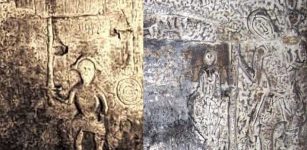 Mysterious Royston Cave And Its Unexplained Carvings Still Puzzle Scientists
Featured Stories | Jan 11, 2014
Mysterious Royston Cave And Its Unexplained Carvings Still Puzzle Scientists
Featured Stories | Jan 11, 2014 -
 Spectacular Giant Bronze Age Hall Found Near Berlin, Germany May Be Connected To Legendary King Hinz
Archaeology | Nov 6, 2023
Spectacular Giant Bronze Age Hall Found Near Berlin, Germany May Be Connected To Legendary King Hinz
Archaeology | Nov 6, 2023 -
 Biblical Cherubim – Sweet Angels Or Dangerous Creatures With A Hidden Agenda?
Biblical Mysteries | Jun 9, 2018
Biblical Cherubim – Sweet Angels Or Dangerous Creatures With A Hidden Agenda?
Biblical Mysteries | Jun 9, 2018 -
 Reliefs And Engravings Of Celestial Bodies And A Zodiac On Walls And Ceilings Of Luxor’s Esna Temple
Archaeology | Oct 5, 2023
Reliefs And Engravings Of Celestial Bodies And A Zodiac On Walls And Ceilings Of Luxor’s Esna Temple
Archaeology | Oct 5, 2023 -
 How Did A Major Cooling Event 8,200 Years Ago Affect Hunter-Gatherers?
Archaeology | Jan 28, 2022
How Did A Major Cooling Event 8,200 Years Ago Affect Hunter-Gatherers?
Archaeology | Jan 28, 2022 -
 Neolithic Farmers Invented Methods To Fight Pests 8,000 Years Ago
Archaeology | Jun 30, 2022
Neolithic Farmers Invented Methods To Fight Pests 8,000 Years Ago
Archaeology | Jun 30, 2022 -
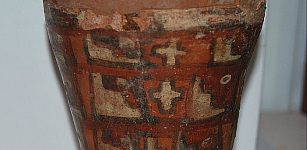 Qeros: Study Of Drinking Vessels Provide New Clues To Long Traditions Of Andean People
Archaeology | Jul 27, 2020
Qeros: Study Of Drinking Vessels Provide New Clues To Long Traditions Of Andean People
Archaeology | Jul 27, 2020 -
 Magical Ring Of Gyges And Its Power To Be Invisible At Will
Featured Stories | Feb 16, 2023
Magical Ring Of Gyges And Its Power To Be Invisible At Will
Featured Stories | Feb 16, 2023 -
 Ancient Mystery Of The Enigmatic ‘Cat Men’ – Advanced Prehistoric Machines Or Humanoids? – Part 2
Featured Stories | Jan 20, 2021
Ancient Mystery Of The Enigmatic ‘Cat Men’ – Advanced Prehistoric Machines Or Humanoids? – Part 2
Featured Stories | Jan 20, 2021 -
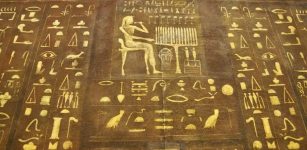 Decipher Hieroglyphs And Ancient Egyptian Images With Google’s AI Fabricius
Linguistic Discoveries | Jul 22, 2020
Decipher Hieroglyphs And Ancient Egyptian Images With Google’s AI Fabricius
Linguistic Discoveries | Jul 22, 2020 -
 Rose Cross – Powerful Symbol That Existed Long Before Christianity
Ancient Symbols | Dec 3, 2017
Rose Cross – Powerful Symbol That Existed Long Before Christianity
Ancient Symbols | Dec 3, 2017 -
 Evolution Of Tree Roots Led To Ancient Mass Extinctions – Geologists Say
Archaeology | Nov 11, 2022
Evolution Of Tree Roots Led To Ancient Mass Extinctions – Geologists Say
Archaeology | Nov 11, 2022

